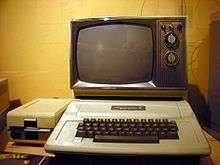Definify.com
Webster 1828 Edition
Computer
COMPUTER
,Noun.
Definition 2026
Computer
Computer
German
Noun
Computer m (genitive Computers, plural Computer)
Declension
Declension of Computer
Synonyms
computer
computer
English

An electronic computer (circa early 1980s).
Noun
computer (plural computers)
- (now rare, chiefly historical) A person employed to perform computations; one who computes. [from 17th c.]
- 1927, J. B. S. Haldane, Possible Worlds and Other Essays, page 173
- Only a few years ago Mr. Powers, an American computer, disproved a hypothesis about prime numbers which had held the field for more than 250 years.
- 2003, Bill Bryson, A Short History of Nearly Everything, BCA, page 116:
- One Harvard computer, Annie Jump Cannon, used her repetitive acquaintance with the stars to devise a system of stellar classifications so practical that it is still in use today.
- 1927, J. B. S. Haldane, Possible Worlds and Other Essays, page 173
- by restriction, a male computer, where the female computer is called a computress
- A programmable electronic device that performs mathematical calculations and logical operations, especially one that can process, store and retrieve large amounts of data very quickly; now especially, a small one for personal or home use employed for manipulating text or graphics, accessing the Internet, or playing games or media. [from 20th c.]
Quotations
- For usage examples of this term, see Citations:computer.
Synonyms
- (programmable device that performs logical operations): automatic data processing machine, processor, 'puter (informal), box (slang), machine, calculator
- See also Wikisaurus:computer
Hyponyms
- (programmable device that performs logical operations): desktop, laptop, portable computer
- (a person employed to perform computations): computress f
Derived terms
Derived terms
Related terms
Related terms
Translations
device
|
|
person
|
|
See also
Dutch
Pronunciation
- IPA(key): /kɔmˈpjutər/
Etymology
Borrowing from English computer.
Noun
computer m (plural computers, diminutive computertje n)
Verb
computer
French
Etymology
Borrowing from Latin computō, computāre (“to compute, sum up”). See also the doublets compter, and conter.
Verb
computer
- (old) to compute
- 1802, François-René de Chateaubriand, Génie du christianisme
- Quant aux ères, ici on compte par l'année de la création, là par olympiade, par la fondation de Rome, par la naissance de Jésus-Christ, par l'époque d'Eusèbe, par celle des Séleucides, celle de Nabonassar, celle des martyrs. Les Turcs ont leur hégire, les Persans leur yezdegerdic. On compute encore par les éres julienne, grégorienne, ibérienne et actienne.
- As the eras, here they compute by the year of the creation, there by olympiads, by the foundation of Rome, by the birth of Christ, by the epoch of Eusebius, by that of Seleucids, of Nabonassar, of the Martyrs. The Turks have their hegira, the Persians their yezdegerdie. The Julian, Gregorian, Iberian and Actian eras, are also employed in computation.
- Quant aux ères, ici on compte par l'année de la création, là par olympiade, par la fondation de Rome, par la naissance de Jésus-Christ, par l'époque d'Eusèbe, par celle des Séleucides, celle de Nabonassar, celle des martyrs. Les Turcs ont leur hégire, les Persans leur yezdegerdic. On compute encore par les éres julienne, grégorienne, ibérienne et actienne.
- 1802, François-René de Chateaubriand, Génie du christianisme
Conjugation
Conjugation of computer (see also Appendix:French verbs)
| simple | compound | ||||||
|---|---|---|---|---|---|---|---|
| infinitive | computer | avoir computé | |||||
| gerund | en computant | en ayant computé | |||||
| present participle | computant /kɔ̃.py.tɑ̃/ |
||||||
| past participle | computé /kɔ̃.py.te/ |
||||||
| person | singular | plural | |||||
| first | second | third | first | second | third | ||
| indicative | je (j’) | tu | il | nous | vous | ils | |
| simple tenses |
present | compute /kɔ̃.pyt/ |
computes /kɔ̃.pyt/ |
compute /kɔ̃.pyt/ |
computons /kɔ̃.py.tɔ̃/ |
computez /kɔ̃.py.te/ |
computent /kɔ̃.pyt/ |
| imperfect | computais /kɔ̃.py.tɛ/ |
computais /kɔ̃.py.tɛ/ |
computait /kɔ̃.py.tɛ/ |
computions /kɔ̃.py.tjɔ̃/ |
computiez /kɔ̃.py.tje/ |
computaient /kɔ̃.py.tɛ/ |
|
| past historic1 | computai /kɔ̃.py.te/ |
computas /kɔ̃.py.ta/ |
computa /kɔ̃.py.ta/ |
computâmes /kɔ̃.py.tam/ |
computâtes /kɔ̃.py.tat/ |
computèrent /kɔ̃.py.tɛʁ/ |
|
| future | computerai /kɔ̃.py.tʁe/ |
computeras /kɔ̃.py.tʁa/ |
computera /kɔ̃.py.tʁa/ |
computerons /kɔ̃.py.tʁɔ̃/ |
computerez /kɔ̃.py.tʁe/ |
computeront /kɔ̃.py.tʁɔ̃/ |
|
| conditional | computerais /kɔ̃.py.tʁɛ/ |
computerais /kɔ̃.py.tʁɛ/ |
computerait /kɔ̃.py.tʁɛ/ |
computerions /kɔ̃.py.tə.ʁjɔ̃/ |
computeriez /kɔ̃.py.tə.ʁje/ |
computeraient /kɔ̃.py.tʁɛ/ |
|
| compound tenses |
present perfect | Use the present tense of avoir followed by the past participle | |||||
| pluperfect | Use the imperfect tense of avoir followed by the past participle | ||||||
| past anterior1 | Use the past historic tense of avoir followed by the past participle | ||||||
| future perfect | Use the future tense of avoir followed by the past participle | ||||||
| conditional perfect | Use the conditional tense of avoir followed by the past participle | ||||||
| subjunctive | que je (j’) | que tu | qu’il | que nous | que vous | qu’ils | |
| simple tenses |
present | compute /kɔ̃.pyt/ |
computes /kɔ̃.pyt/ |
compute /kɔ̃.pyt/ |
computions /kɔ̃.py.tjɔ̃/ |
computiez /kɔ̃.py.tje/ |
computent /kɔ̃.pyt/ |
| imperfect1 |
computasse /kɔ̃.py.tas/ |
computasses /kɔ̃.py.tas/ |
computât /kɔ̃.py.ta/ |
computassions /kɔ̃.py.ta.sjɔ̃/ |
computassiez /kɔ̃.py.ta.sje/ |
computassent /kɔ̃.py.tas/ |
|
| compound tenses |
past | Use the present subjunctive tense of avoir followed by the past participle | |||||
| pluperfect1 | Use the imperfect subjunctive tense of avoir followed by the past participle | ||||||
| imperative | – | tu | – | nous | vous | – | |
| — | compute /kɔ̃.pyt/ |
— | computons /kɔ̃.py.tɔ̃/ |
computez /kɔ̃.py.te/ |
— | ||
| 1literary tenses | |||||||